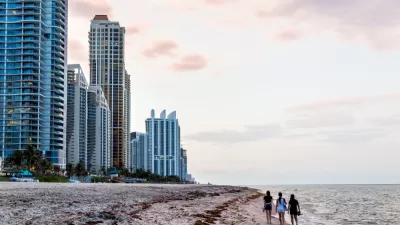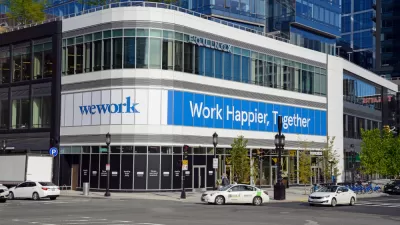Another buzzy tech company with roots in the real estate market has designs on the "smart cities" revolution.

"The company behind the WeWork real-estate empire is starting a 'future cities' initiative and has hired former Waze and Google executive Di-Ann Eisnor to run it," reports Simone Stolzoff.
"According to the We Company, Eisnor and [a] team of engineers, architects, data scientists, biologists, and economists will create products and partner with local groups around the world to help address problems spurred by globalization, urbanization, and climate change," according to Stolzoff.
According to the article, the goals and potential outcomes of the project, as announced, remain a bit abstract. However, "[t]he move to launch a smart cities program, though, is in line with one of the company’s non-spiritual missions: to compile the world’s largest data set on how people work and live." That goal is reminiscent of Facebook's ongoing mission to map the entire world's built environment to measure population density using artificial intelligence.
WeWork's foray into the "smart" or "future" cities realm also follows in the footsteps of Sidewalk Labs, a company owned by Google parent company Alphabet, which has been granted an entire neighborhood in Toronto, and potentially more, to treat as a "smart city" experiment.
FULL STORY: The We Company is launching a “smart cities” project and hired a Google executive to lead it

Alabama: Trump Terminates Settlements for Black Communities Harmed By Raw Sewage
Trump deemed the landmark civil rights agreement “illegal DEI and environmental justice policy.”

Study: Maui’s Plan to Convert Vacation Rentals to Long-Term Housing Could Cause Nearly $1 Billion Economic Loss
The plan would reduce visitor accommodation by 25% resulting in 1,900 jobs lost.

Why Should We Subsidize Public Transportation?
Many public transit agencies face financial stress due to rising costs, declining fare revenue, and declining subsidies. Transit advocates must provide a strong business case for increasing public transit funding.

Wind Energy on the Rise Despite Federal Policy Reversal
The Trump administration is revoking federal support for renewable energy, but demand for new projects continues unabated.

Passengers Flock to Caltrain After Electrification
The new electric trains are running faster and more reliably, leading to strong ridership growth on the Bay Area rail system.

Texas Churches Rally Behind ‘Yes in God’s Back Yard’ Legislation
Religious leaders want the state to reduce zoning regulations to streamline leasing church-owned land to housing developers.
Urban Design for Planners 1: Software Tools
This six-course series explores essential urban design concepts using open source software and equips planners with the tools they need to participate fully in the urban design process.
Planning for Universal Design
Learn the tools for implementing Universal Design in planning regulations.
Caltrans
Smith Gee Studio
Institute for Housing and Urban Development Studies (IHS)
City of Grandview
Harvard GSD Executive Education
Toledo-Lucas County Plan Commissions
Salt Lake City
NYU Wagner Graduate School of Public Service





























